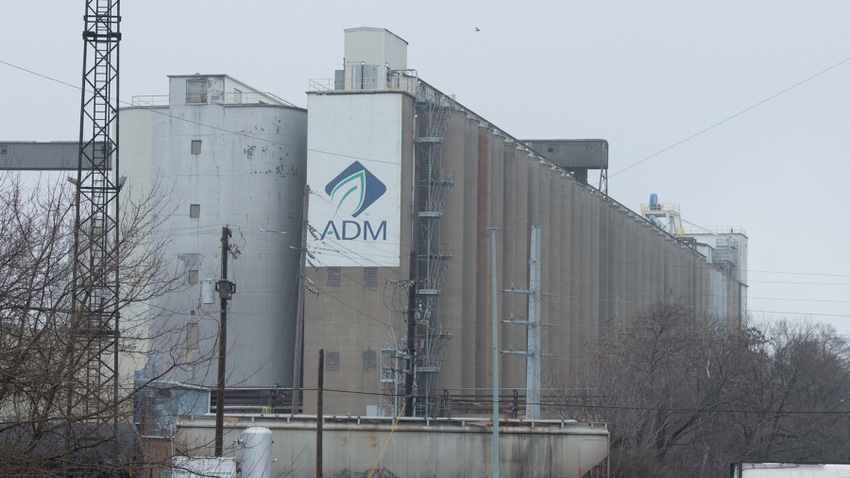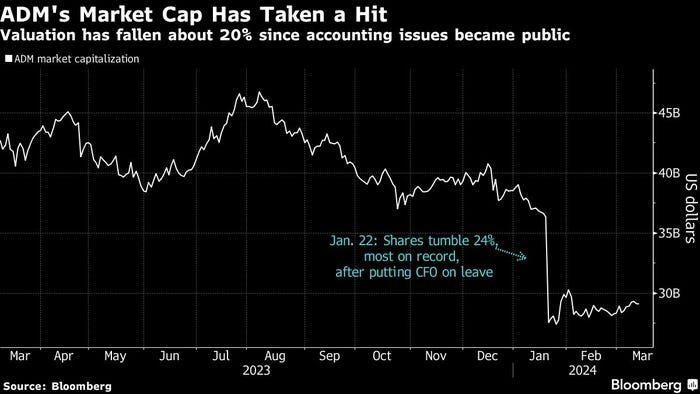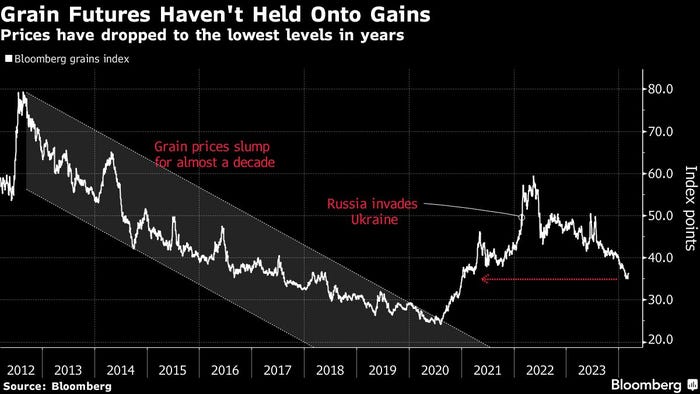
By Gerson Freitas Jr., Isis Almeida and Anne Riley Moffat
It took just one day for Archer-Daniels-Midland Co. to lose more than $8 billion in value following news of an investigation into its accounting practices earlier this year. Bouncing back will take a lot longer.
The storied agricultural commodities trader, which historically dubbed itself the “supermarket to the world,” has spent billions to grow its nutrition unit, the business that makes pet food and veggie burgers that’s now under scrutiny. But the strategy to diversify beyond corn, wheat and soybean trading — ADM’s staples — has faltered, with no obvious alternative in place.
To make matters worse, the cycle for its core agricultural commodities has turned, with rising grain inventories sparking predictions of more price declines ahead. While ADM said on Tuesday it’s taking aggressive steps to fix its nutrition business — slashing product lines and mulling potential asset sales — investors may not be rushing to re-buy shares any time soon. ADM has only regained a fraction of its diminished market capitalization in the nearly two months since it disclosed the probe.

“ADM is going to have to show that the nutrition business can grow,” said Seth Goldstein, an analyst at Morningstar Inc. “They need to show profit growth and margin restoration back closer to what we saw in 2021, 2022.”
Chicago-based ADM has helped put the “big” in Big Food for more than a century. Grab a slice of bread in the U.S., a tortilla in Mexico or a pork dumpling in China, and the odds are good that the company or rivals Bunge Global SA, Cargill Inc., or Louis Dreyfus Co. — known as the ABCDs of crop trading — had a hand in it.
But as profits for their traditional businesses started to slump about a decade ago, the trading houses pivoted. Cargill focused on growing in beef, Bunge sold under-performing assets and Dreyfus shrank and tried to move downstream.
ADM’s growth strategy centered around human and animal nutrition. It spent $3 billion to acquire Wild Flavors GmbH and another $1.8 billion to take over animal-feed maker Neovia, the company’s largest-ever deals. But that bet has largely failed to live up to expectations, due in part to faltering demand for plant-based ingredients and animal feed.
For a while, Russia’s invasion of Ukraine, which sent grain prices soaring, boosted overall earnings, diverting attention away from nutrition. But an internal inquiry into accounting practices in the nutrition segment, sparked by a document request from the top US securities regulator, threw the unit into the spotlight again. A federal investigation has followed, with the company confirming on Tuesday that some of its employees had received subpoenas.

“Nutrition has been a growth story for many years, and we certainly stumbled in 2023,” Chief Executive Officer Juan Luciano said a call with analysts, citing a mix of market forces and company missteps.
Probes by the U.S. Securities and Exchange Commission and the Department of Justice center around transactions between the nutrition business and other segments. After ADM’s own internal investigation, the company has reinstated some intersegment results for the past several years.
Operating profit in the nutrition unit was reduced by 7% on average between 2018 and 2022, Morgan Stanley analysts said, “which we think is likely to be viewed as better-than-feared all else equal.” The company also announced more share buybacks, which helped boost the stock by as much as 6.5% during intraday trading.
But returning to stock-price levels seen earlier this year will take a while. A number of investors won’t even be able to buy the shares before the investigation is fully concluded, said Sam Margolin, a managing director at Wolfe Research LLC.
“Some investors have written into their proxies or their bylaws that they might be restricted from buying stock while the company is under investigation,” he said. “But also during the investigation the company is not able to answer every question about the business directly. As long as that’s the case, there’s going to be a certain amount of investors who can’t buy the stock.”
ADM’s nutrition unit reported operating profit that tumbled 36% last year, far worse than the single-digit declines in its other key businesses. The segment also recorded a rare operating loss during the fourth quarter.
Luciano is now promising a turnaround for the beleaguered unit. He has cut the number of brands it offers customers by two-thirds and slashed individual product offerings by 17%, reducing production-line complexity. The company has also replaced the unit’s management team and ended its 50% joint-venture in ADM Vland Biotech Shandong Co. Ltd., which makes human probiotics in China. ADM said it has hired third-party experts to find more ways to improve the unit.
The nutrition division still has an important role in ADM’s business model, Luciano said. Still, the company constantly reviews its underperforming assets and has in the past opted to divest when it made sense, from its Bolivian oilseeds operations to its global cocoa business.
“We make sure that if there are some things that are self-inflicted, we correct those things,” Luciano said. After that, ADM decides “whether they belong in nutrition, or they belong in another part of ADM, or they belong outside ADM.”
“We’re in that process,” he added. “Nothing to announce today, but we continue to look at that very deeply.”
© 2024 Bloomberg L.P.
About the Author(s)
You May Also Like




